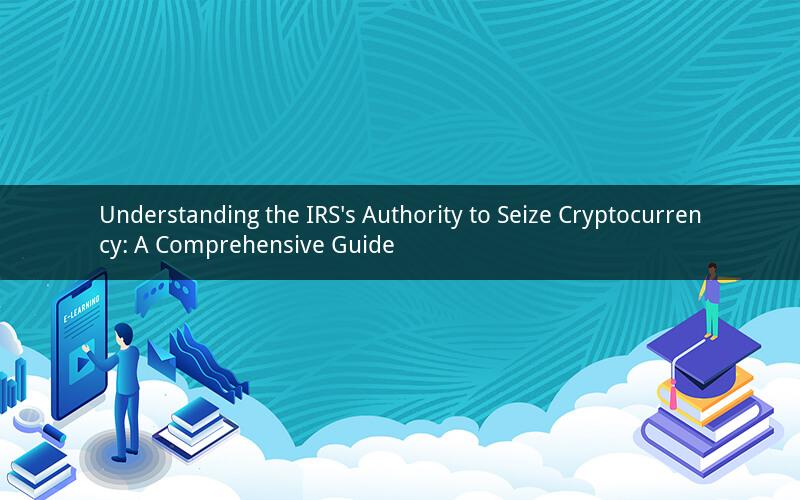
Introduction:
Cryptocurrency has gained immense popularity in recent years, but it has also raised concerns about tax compliance and financial transparency. One of the most pressing questions for cryptocurrency holders is whether the IRS can seize their digital assets. This article delves into the IRS's authority to seize cryptocurrency, providing an in-depth analysis of the legal framework and potential consequences.
I. The IRS's Authority to Seize Cryptocurrency
1. Legal Basis
The IRS has the authority to seize cryptocurrency under various legal provisions, primarily the Bank Secrecy Act (BSA) and the Internal Revenue Code (IRC). These laws empower the IRS to investigate and enforce tax laws, including the reporting of cryptocurrency transactions.
2. BSA
The BSA requires financial institutions, including cryptocurrency exchanges, to report suspicious transactions and maintain records of customer transactions. If the IRS suspects that a cryptocurrency transaction is related to tax evasion or money laundering, it can request information from exchanges and seize the assets.
3. IRC
The IRC provides the IRS with the authority to seize assets, including cryptocurrency, if a taxpayer owes taxes. The IRS can issue a levy, which is a legal order to garnish wages, seize property, or freeze bank accounts. Cryptocurrency is considered property under the IRC, making it subject to seizure.
II. Procedures for Seizing Cryptocurrency
1. Civil and Criminal Enforcement
The IRS can seize cryptocurrency through both civil and criminal enforcement actions. Civil enforcement involves issuing a levy or a summons to seize assets, while criminal enforcement involves investigating and charging individuals with tax evasion or money laundering.
2. Voluntary Disclosure
Taxpayers who have not reported their cryptocurrency transactions or owe taxes can enter into a voluntary disclosure program with the IRS. By coming forward and disclosing their cryptocurrency holdings, taxpayers may avoid criminal prosecution and negotiate a reduced penalty.
3. Audit and Examination
The IRS may initiate an audit or examination of a taxpayer's cryptocurrency transactions if there is a reasonable belief that the taxpayer has failed to comply with tax laws. During the examination, the IRS can request information about cryptocurrency transactions and assets, potentially leading to seizure.
III. Challenges and Limitations in Seizing Cryptocurrency
1. Anonymity and Privacy
Cryptocurrency transactions are often pseudonymous, making it difficult for the IRS to trace the flow of funds. This anonymity poses a significant challenge for the IRS in identifying and seizing cryptocurrency assets.
2. Technological Barriers
The IRS faces technological barriers in monitoring and tracking cryptocurrency transactions. The decentralized nature of blockchain technology makes it challenging to trace transactions and identify the parties involved.
3. Jurisdictional Issues
Seizing cryptocurrency across different jurisdictions can be complex. The IRS must navigate international laws and regulations, which may vary significantly from one country to another.
IV. Potential Consequences of Cryptocurrency Seizure
1. Financial Loss
Seizing cryptocurrency can result in significant financial loss for the taxpayer. If the seized assets are worth more than the tax debt, the excess funds may be returned to the taxpayer after the debt is settled.
2. Criminal Charges
In cases of tax evasion or money laundering, the IRS can pursue criminal charges against the taxpayer. This can lead to penalties, fines, and imprisonment.
3. Reputation Damage
Seizing cryptocurrency can damage the reputation of the taxpayer, particularly if the seizure is publicly disclosed. This can have long-term consequences for personal and professional relationships.
V. Conclusion
The IRS has the authority to seize cryptocurrency under various legal provisions, primarily the BSA and the IRC. While there are challenges and limitations in seizing cryptocurrency, the IRS remains committed to enforcing tax laws and ensuring compliance. Taxpayers should be aware of the potential consequences of failing to report cryptocurrency transactions and take proactive steps to comply with tax laws.
Questions and Answers:
1. Q: Can the IRS seize cryptocurrency without a warrant?
A: Yes, the IRS can seize cryptocurrency without a warrant if it is part of a civil enforcement action. However, a warrant is required for criminal enforcement actions.
2. Q: Can the IRS seize cryptocurrency from a third party?
A: Yes, the IRS can seize cryptocurrency from a third party if it is related to a tax debt owed by the taxpayer. This can occur if the third party holds the cryptocurrency on behalf of the taxpayer.
3. Q: Can a taxpayer negotiate a settlement for seized cryptocurrency?
A: Yes, taxpayers can negotiate a settlement with the IRS for seized cryptocurrency. This may involve settling the tax debt and negotiating a reduced penalty.
4. Q: Can a taxpayer appeal a seizure of cryptocurrency?
A: Yes, taxpayers have the right to appeal a seizure of cryptocurrency. They can file a petition with the Tax Court or seek relief through the IRS Office of Appeals.
5. Q: Can a taxpayer recover seized cryptocurrency if the IRS later determines that no tax debt is owed?
A: Yes, if the IRS later determines that no tax debt is owed, the seized cryptocurrency may be returned to the taxpayer. However, the process for recovering the assets can be complex and may require legal assistance.